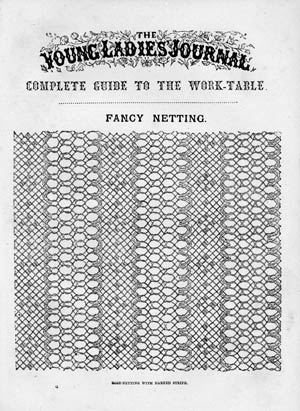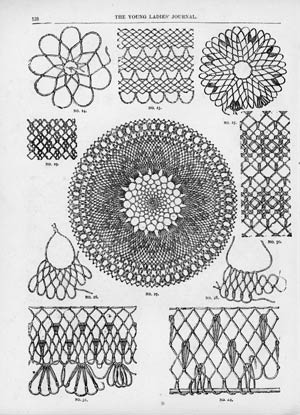![]()
NOTES ON ISSUE 3: GLOSSARY
blue book
"Blue books" was the Victorian term for Parliamentary reports, generally
containing much statistical information, which had blue paper covers.
Mr. M'Choakumchild said he would try me again. And
he said, This schoolroom is an immense town, and in it there are a million of
inhabitants, and only five-and-twenty are starved to death in the streets in
the course of a year. What is your remark on that proportion? And my remark
was—for I couldn't think of a better one—that I thought it must be just as hard
upon those who were starved, whether the others were a million, or a million
million.
Sissy, as Dickens's representative of compassion and humanity in the novel,
here takes the part of the small group who has starved. Her attitude implicitly
criticizes the great principle of Benthamite Utilitarianism: that a rational
society should have as its goal providing the greatest happiness to the greatest
number of its members. Sissy's objection to M'Choakumchild's scenario points
out the flaw in this reasoning: that the miserable remain just as miserable,
whether others are happier or not.
In the hardest working part of Coketown; in the innermost fortifications of
that ugly citadel, where Nature was as strongly bricked out as killing airs
and gases were bricked in; at the heart of the labyrinth of narrow courts upon
courts…
The centers of Victorian cities, lacking good sanitation and desperately overcrowded,
were terribly unhealthy. "The Quiet Poor," an article that appeared
in Household Words on April 8, describes a similar slum in the London
area. (To download the article, see Issue
2.) These two pictures of such areas in Birmingham are taken from
an 1880 work, Old and New Birmingham, by Robert Dent:
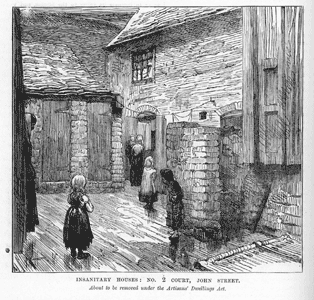
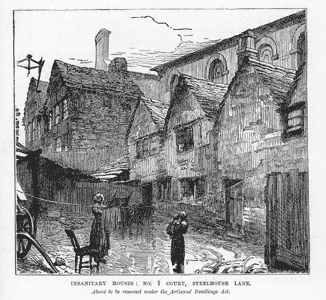
a good power-loom weaver
The power-loom was invented in 1787, and improved and
refined over the years. More than a hundred thousand such looms were operating
in the northern manufacturing regions by 1845, but most workers were younger
than Stephen, and many were women. Operating the power-loom was physically debilitating
and poorly paid, and older men (such as Stephen was, in his milieu, at age 40)
often turned to other employment.
This engraving of "Harrison's Improved Power-Loom" is taken from the
Illustrated London News of August 23, 1851:
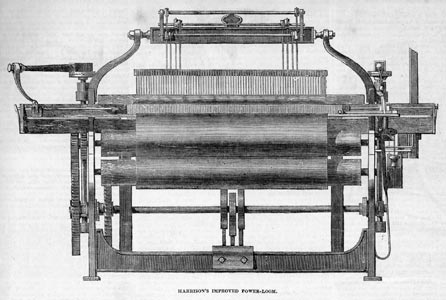
Ten years before the composition of Hard Times,
on May 18, 1844, the
Illustrated London News published this engraving of the interior of
a
power-loom factory:
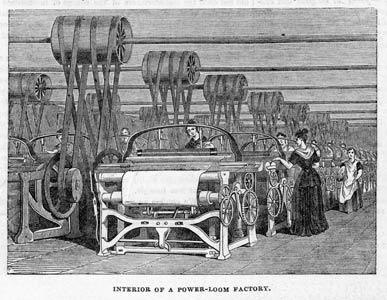
The lights in the great factories, which looked,
when they were illuminated, like Fairy palaces—or the travelers by express-train
said so…
Dickens's description of the lit-up factories ironically
mixes the fancy he advocates in Hard Times with the utilitarian atmosphere
of the factories. It is telling that only the travelers on the express train—rushing
past the factories—can think they look like "Fairy palaces." As Dickens's
descriptions make clear, conditions on the factory floor were generally quite
different. Nevertheless, British industry's manufacturing prowess was a point
of pride for the nation, and as such it was prominently featured at the 1851
Great Exhibition at the Crystal Palace (itself sometimes referred to as a "fairy
palace"). On August 23, 1851, the Illustrated London News devoted
an entire page to an engraving depicting the "machinery department"
at the exhibition.
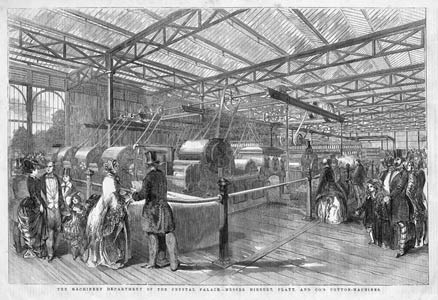
Click
on image for larger view
one of the many small streets for which the favourite
undertaker (who turned a handsome sum out of the one poor ghastly pomp of the
neighbourhood) kept a black ladder, in order that those who had done their daily
groping up and down the narrow stairs might slide out of this working world
by the windows.
Working-class lodgings were often so tightly packed against each other, and
so small inside, that undertakers had to use a ladder to remove the dead. An
example of such housing in Manchester appears in a photograph of old houses
from Manchester As It Is (1878):
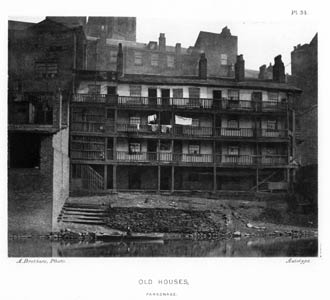
A creature so foul to look at, in her tatters,
stains and splashes, but so much fouler than that in her moral infamy, that
it was a shameful thing even to see her.
Dickens is here implying that not only is Stephen's wife a drunkard (in itself
shameful) but that she is probably sexually immoral as well. In Victorian fiction,
women who are adulterous or otherwise sexually transgressive are often described
as marked by their "moral infamy."
Mrs. Sparsit netting at the fire-side…
Netting was a form of needlecraft, popular among Victorian ladies, that used
linen, cotton, or silk thread to weave mesh purses as well as mesh decorations
for handkerchiefs and similar articles. The "cotton stirrup" was used
to hold the proper tension for making knots. Dickens surely intends us to see
a sharp contrast between Mrs. Sparsit's netting as a leisure pursuit and Stephen's
hard, unremitting labor of weaving at the mill. Note that Mrs. Sparsit carries
on her hobby instead of taking lunch, as a sign of gentility, while Stephen
must forgo his lunch during his one break simply in order to have time to speak
to his employer.
These examples of finished netting are from The Young Ladies' Journal Complete
Guide to the Work-Table (1885):
played old Gooseberry
"Playing gooseberry" often meant acting as a fifth wheel or an undesired
third party, spoiling a tête-à-tête between two lovers. However, here Bounderby
is using it an a less familiar sense, simply to mean "to make havoc."
Nevertheless, the connotations of spoiling a love affair may hint at one element
of Mrs. Blackpool's bad behavior: her adultery, also noted in Bounderby's assertion
that she "found other companions"—a phrase that appeared in the version
of the novel that appeared in Household Words but was struck from the
first bound edition, possibly because of its hints of indelicacy.
brigg
Lancashire dialect for "bridge"
fewtrils
Lancashire dialect for "trifles."
I ha' coom to ask yo, sir, how I am to be ridded
o' this woman.
At the time Dickens wrote, there were two types of divorce: divorce a vinculo
matrimonii (from the bond of marriage), which enabled divorcees to marry
again, and divorce a mensa et thoro (from bed and board), which was in
effect a legal separation. Church courts could grant the latter type, but a
divorce a vinculo matrimonii could only be granted by an Act of Parliament—obviously,
a costly proposition, and one involving a great deal of special influence.
However, the laws relating to divorce in England were undergoing reform even
as Dickens wrote. In 1850, a royal commission was appointed to consider the
laws of divorce; in 1853, the commission recommended that divorce cases be transferred
from church courts to civil courts, and that these new courts be empowered to
grant both types of divorces. Divorces a vinculo matrimonii were to be
granted in cases of adultery, if the husband was suing; if the wife sought the
divorce, she needed to show evidence of "aggravated enormity": that
is, incest or bigamy on the husband's part. Divorces a mensa et thoro
could be granted in cases of adultery, cruelty, or desertion. A bill based on
these recommendations was introduced in Parliament during the serialization
of Hard Times, but did not reach a vote. In 1857, the Matrimonial Causes
Act was passed implementing these changes.
Spite o' all that, they can be set free for smaller wrongs than is suffered
by hundreds an' hundreds of us—by women fur more than men—they can be set free
for smaller wrongs.
The portion of this passage that follows the phrase "they can be set free
for smaller wrongs" is unique to the Household Words edition of
Hard Times; it was changed in the first volume edition. Some of the more
pointed and topical mentions of divorce in the Household Words text relate
specifically to the article "One of Our Legal Fictions," which appeared
the week before this number of Hard Times and which discussed some of
the injustices to women in particular that were inherent in the laws concerning
marriage and divorce at the time. A second reference to the injustices to women
in divorce law comes a short time later in the chapter, when Stephen says that
the inability to get a divorce "brings many common married fok (agen I
say, women fur of'ener than men) to battle, murder, and sudden death."
The parenthetical aside is unique to the text in Household Words.
Doctors' Commons
The popular collective name for the canon-law courts in London that had jurisdiction
over matrimonial cases. Dickens worked as a shorthand writer in Doctors' Commons
from 1830 to 1832. Doctors' Commons was dissolved in 1857, when the Divorce
Act transferred authority over such cases to new civil courts.
By Parliamentary
That is, by the cheapest form of rail travel,"Parliamentary" railroad;
an 1844 Act of Parliament required all railways to run a daily passenger train
at a rate not exceeding a penny per mile.
